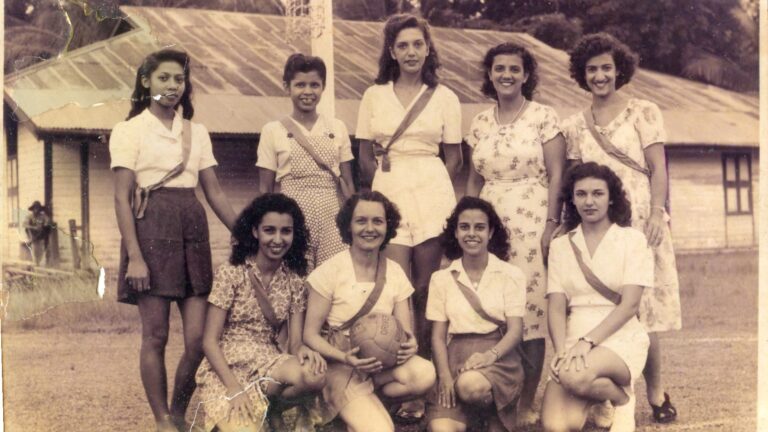Hilda DanielNew York City, New York, USA

Pictured is my mother (front row) with her net ball team in Singapore. I believe this was taken at the British Army medical base where she worked. I come from a small Sephardic Jewish community in Singapore. My grandparents came to Singapore from Bombay and Bagdad. I moved to America (Los Angeles) with my mother and sister when I was nine. I have cousins in Singapore, Australia, Isreal, America; one of my uncles settled in London, England. We always thought of ourselves as Singapore Jews. We spoke Malay and English (pehaps a bit of Mandarin), and used many expressions I recognize now as Arab (but which still register as Jewish); when their education was interrupted by the Japanese occupation during the War, both my mother and father learned to speak Japanese. Being Jewish is what defined us, set us apart and isolated us; it also provided a community of support. I knew we were hated for being Jews, more so being poor Jews (though it must be said I never felt impoverished). My family was interned in Japanese concentration camps during the WWII. They never talked much about their time in the camps, about brutality, violence, hardships, deaths– what I knew of this or any part of their past was told in passing or overheard in hushed adult conversations: Japanese soldiers came to their home, rounded up the men and boys and took them away, returned a week or so later and took the women and girls… the men had been digging their own graves when they were liberated… decapitated heads were displayed on spikes in the streets… the ghosts of dead soldiers still hung in the trees… — not dwelling on it, moving forward was the way to survive. Because of this haunted silence, and because I didn’t have the same Hebrew education as boys (girls didn’t – my mum did have my cousins tutor my sister and me after primary school every day and we were generally first in class – an emphasis on education which I think of as very Jewish), my child’s experience of Jewishness was absorbed more than taught, it was vague and engulfing, pious and superstitious, sad and magic — it hung heavy in the air with the smell of joss sticks and flowers in warm insect nights. I don’t represent this as the experience of all Jews in Singapore – just my own. My mother and grandmother were always lively and laughing and the music was always on – Singapore was a wonderful place to grow up. But it never stopped being a thrill to be in America where there are other Jews, where it’s taken for granted (even if a little retroactively lonely to know that most don’t know of Jews in Singapore). As an artist from such a background, it seems miraculous to me to now live in the Upper East Side of NYC (moved here for a Masters Degree and stayed) and to see Simon Schama present this series at a place like the 92Y. I sometimes think it’s my promised land, my Jerusalem. Happy Passover, everyone!
